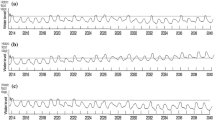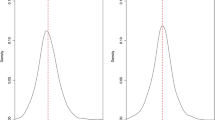Abstract
The role of extreme weather events in shaping people’s climate change beliefs and adaptation attitudes has been extensively studied and discussed in academic literature, the popular press, and policy circles. In this manuscript, we contribute to the debate by using data from pre- and post-extreme event surveys to examine the effects of the 2012 Midwestern US drought on agricultural advisors’ climate change beliefs, adaptation attitudes, and risk perceptions. We found that neither climate change beliefs nor attitudes toward adaptation changed significantly as a result of the drought. Risk perceptions did change, however, with advisors becoming more concerned about risks from drought and pests and less concerned about risks related to flooding and ponding. Though increased risk perceptions were significantly associated with more favorable adaptation attitudes, the effects were not large enough to cause an overall shift to more favorable attitudes toward adaptation. The results suggest that extreme climate events might not cause significant shifts in climate beliefs, at least not immediately. Additionally, the results caution that policy designs that rely on increasing risk perceptions to motivate action on climate change may be overestimating the effects of extreme events on feeling at risk, at least in the context of buffered systems such as large commercial agriculture in the US.



Similar content being viewed by others
Notes
Note that the concern about drought variable was omitted from the dry risk perceptions model because that variable was a component of the dry risk dependent variable.
References
Arbuckle Jr JG, Morton LW, Hobbs J (2013a) Farmer beliefs and concerns about climate change and attitudes toward adaptation and mitigation: evidence from Iowa. Clim Chang 118:551–563
Arbuckle Jr JG, Prokopy LS, Haigh T, et al. (2013b) Climate change beliefs, concerns, and attitudes toward adaptation and mitigation among farmers in the Midwestern United States. Clim Chang 117:943–950. doi:10.1007/s10584-013-0707-6
Brody SD, Zahran S, Vedlitz A, Grover H (2008) Examining the relationship between physical vulnerability and public perceptions of global climate change in the United States. Environ Behav 40:72–95. doi:10.1177/0013916506298800
Carlton JS, Jacobson SK (2013) Climate change and coastal environmental risk perceptions in Florida. J Environ Manag 130:32–39. doi:10.1016/j.jenvman.2013.08.038
Carlton JS, Jacobson SK (2015) Using expert and non-expert models of climate change to enhance communication. Environ Commun (ahead-of-print):1–24
Carlton JS, Angel JR, Fei S, et al. (2014) State service foresters’ attitudes toward using climate and weather information when advising forest landowners. J For. doi:10.5849/jof.13-054
Carlton JS, Perry-Hill R, Huber M, Prokopy LS (2015) The climate change consensus extends beyond climate scientists. Environ Res Lett 10(9):094025
Chiotti QP, Johnston T (1995) Extending the boundaries of climate change research: a discussion on agriculture. J Rural Stud 11:335–350. doi:10.1016/0743-0167(95)00023-G
Diggs DM (1991) Drought experience and perception of climatic change among Great Plains farmers. Great Plains Res J Nat Soc Sci 114–132
Eakin HC, Lemos MC, Nelson DR (2014) Differentiating capacities as a means to sustainable climate change adaptation. Glob Environ Chang 27:1–8
Easterling WE (1996) Adapting North American agriculture to climate change in review. Agric For Meteorol 80:1–53. doi:10.1016/0168-1923(95)02315-1
Environmental Protection Agency (2013). Green house gases inventory data explorer. http://www3.epa.gov/climatechange/ghgemissions/inventoryexplorer/. Accessed 4 Sep 2014
Fishbein M, Ajzen I (2010) Predicting and changing behavior: the reasoned action approach 538
Foley JA, DeFries R, Asner GP, et al. (2005) Global consequences of land use. Science 309:570–574. doi:10.1126/science.1111772
Gifford R (2011) The dragons of inaction: psychological barriers that limit climate change mitigation and adaptation. Am Psychol 66:290
Goebbert K, Jenkins-Smith HC, Klockow K, Nowlin MC, Silva CL (2012) Weather, climate, and worldviews: the sources and consequences of public perceptions of changes in local weather patterns. Weather Clim Soc 4:132–144
Haden VR, Niles MT, Lubell M, Perlman J, Jackson LE (2012) Global and local concerns: what attitudes and beliefs motivate farmers to mitigate and adapt to climate change. PLoS One 7(12):e52882
Haigh T, Takle E, Andresen J, Widhalm M, Carlton JS, Angel J (2015) Mapping the decision points and climate information use of agricultural producers across the US Corn Belt. Clim Risk Manag 7:20–30
Hatfield J, Takle G, Grotjahn R, Holden P, Izaurralde RC, Mader T, Marshall E, Liverman D (2014) In: Melillo JM, Richmond TC, Yohe GW (eds) Ch. 6: Agriculture. Climate change impacts in the United States: the third national climate assessment. U.S. Global Change Research Program, pp. 150–174
Hoerling M, Schubert S, Mo K, et al. (2013) An interpretation of the origins of the 2012 central great plains drought. NOAA Drought Task Force
Hollander M, Wolfe DA, Chicken E (2013) Nonparametric statistical methods. Wiley
Kahan DM, Jenkins-Smith H, Braman D (2011) Cultural cognition of scientific consensus. J Risk Res 14:147–174. doi:10.1080/13669877.2010.511246
Kingdon, JW (1984) Agendas, Alternatives, and Public Policies. Boston: Little, Brown
Lemos MC, Lo YJ, Kirchhoff C, Haigh T (2014) Crop advisors as climate information brokers: building the capacity of US farmers to adapt to climate change. Clim Risk Manag 4:32–42
Malcolm S, Marshall E, Aillery M, et al. (2012) Agricultural adaptation to a changing climate: economic and environmental implications vary by US region. USDA-ERS Economic Research Report
Mase AS, Cho H, Prokopy LS (2015) Enhancing the social amplification of risk framework (SARF) by exploring trust, the availability heuristic, and agricultural advisors’ belief in climate change. J Environ Psychol 41:166–176
McCright AM, Dunlap RE (2011) Cool dudes: the denial of climate change among conservative white males in the United States. Glob Environ Chang 21:1163–1172. doi:10.1016/j.gloenvcha.2011.06.003
Myers TA, Maibach EW, Roser-Renouf C, et al. (2013) The relationship between personal experience and belief in the reality of global warming. Nat Clim Chang 3:343–347. doi:10.1038/nclimate1754
Niles MT, Lubell M, Haden VR (2013) Perceptions and responses to climate policy risks among California farmers. Glob Environ Chang. 23:1752–1760
O’Connor RE, Bord RJ, Fisher A (1999) Risk perceptions, general environmental beliefs, and willingness to address climate change. Risk Anal 19:461–471. doi:10.1023/A:1007004813446
O’Connor RE, Yarnal B, Dow K, et al. (2005) Feeling at risk matters: water managers and the decision to use forecasts. Risk Anal 25:1265–1275. doi:10.1111/j.1539-6924.2005.00675.x
Olesen JE, Bindi M (2002) Consequences of climate change for European agricultural productivity, land use and policy. Eur J Agron 16:239–262. doi:10.1016/S1161-0301(02)00004-7
Poortinga W, Spence A, Whitmarsh L, Capstick S, Pidgeon NF (2011) Uncertain climate: an investigation into public scepticism about anthropogenic climate change. Glob Environ Chang 21:1015–1024
Prokopy LS, Haigh T, Mase AS, et al. (2013) Agricultural advisors: a receptive audience for weather and climate information? Weather Clim Soc 5:162–167
Prokopy LS, Carlton JS, Arbuckle JG, Haigh T, Lemos MC, Mase AS, Babin N, Dunn M, Andresen J, Angel J, Hart C, Power R (2015) Extension’s role in disseminating information about climate change to agricultural stakeholders. Clim Chang 130:261–272
Rosenzweig C, Iglesias A, Yang X, et al. (2001) Climate change and extreme weather events; implications for food production, plant diseases, and pests. Glob Chang Hum Health 2:90–104. doi:10.1023/A:1015086831467
Smit B, Skinner M (2002) Adaptation options in agriculture to climate change: a typology. Mitig Adapt Strateg Glob Chang 7:85–114. doi:10.1023/A:1015862228270
Spence A, Poortinga W, Butler C, Pidgeon NF (2011) Perceptions of climate change and willingness to save energy related to flood experience. Nat Clim Chang 1:46–49. doi:10.1038/nclimate1059
Stevens JP (2012) Applied multivariate statistics for the social sciences. Routledge
Syal SS, Wilson RS, Crawford JM, Lutz J (2011) Climate change and human health—what influences the adoption of adaptation programming in the United States public health system? Mitig Adapt Strateg Glob Chang 16:911–924. doi:10.1007/s11027-011-9302-1
U.S. Bureau of Economic Analysis (2013) Value added by industry. http://www.bea.gov/iTable/iTable.cfm?ReqID=51&step=1#reqid=51&step=51&isuri=1&5114=a&5102=1. Accessed 1 Aug 2014
Weber E.U (2006) Experience-based and description-based perceptions of long-term risk: Why global warming does not scare us (yet). Climatic Change, 77(1–2):103–120. doi:10.1007/s10584-006-9060-3
Weber EU, Stern PC (2011) Public understanding of climate change in the United States. Am Psychol 66:315–328. doi:10.1037/a0023253
Wheeler S, Zuo A, Bjornlund H (2013) Farmers’ climate change beliefs and adaptation strategies for a water scarce future in Australia. Glob Environ Chang 23(2):537–547
Whitmarsh L (2008) Are flood victims more concerned about climate change than other people? The role of direct experience in risk perception and behavioural response. J Risk Res 11:351–374. doi:10.1080/13669870701552235
Acknowledgments
The authors would like to thank Jim Angel, J. Gordon Arbuckle, Jr., Mike Hayes, Jon Hobbs, Cosimo Matassa, Mark Svboda, and Melissa Widhalm for their help in conceptualizing and preparing this manuscript. This research was supported by Agriculture and Food Research Initiative Competitive Grant no. 2011-68002-30220 from the USDA National Institute of Food and Agriculture and by NOAA Sectoral Applications Research Program (SARP) grant number NA13OAR431012.
Author information
Authors and Affiliations
Corresponding author
Electronic supplementary material
Supplemental Figure 1
(PDF 13.3 kb)
Supplemental Figure 2
(PDF 308 kb)
Supplemental Figure 3
(PDF 693 kb)
Supplemental Figure 4
(PDF 439 kb)
Supplemental Figure 5
(PDF 927 kb)
Supplemental Figure 6
(PDF 978 kb)
Supplemental Figure 7
(PDF 1153 kb)
Supplemental Figure 8
(PDF 404 kb)
Supplemental Table 1
(PDF 20 kb)
Supplemental Table 2
(PDF 20 kb)
Rights and permissions
About this article
Cite this article
Carlton, J.S., Mase, A.S., Knutson, C.L. et al. The effects of extreme drought on climate change beliefs, risk perceptions, and adaptation attitudes. Climatic Change 135, 211–226 (2016). https://doi.org/10.1007/s10584-015-1561-5
Received:
Accepted:
Published:
Issue Date:
DOI: https://doi.org/10.1007/s10584-015-1561-5




